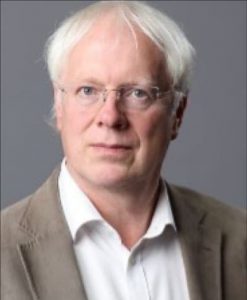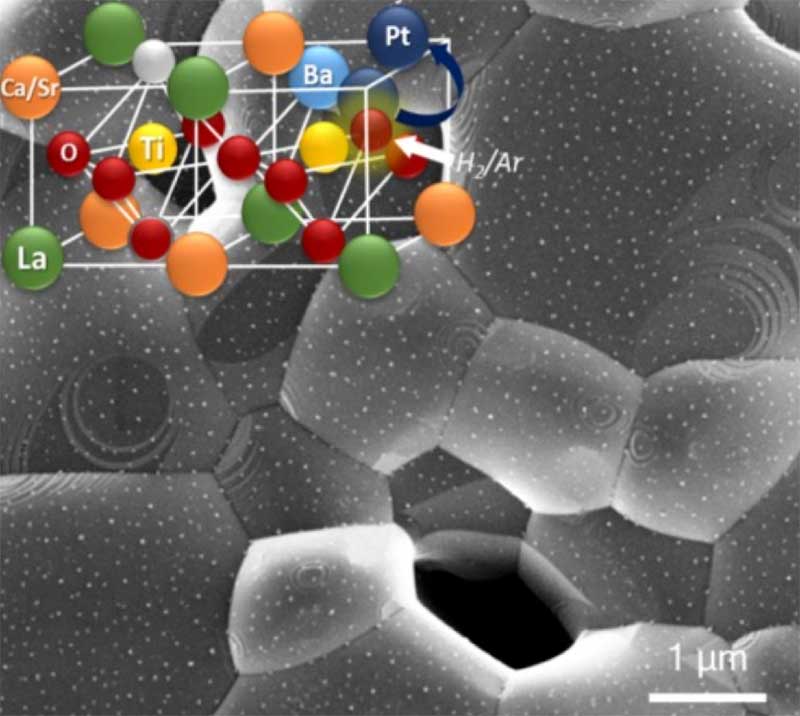John Irvine, FRSE, FRSC
University of St Andrews
Date: December 13, 2023
Time: 1000–1100h ET
Sponsors: Element Six, BioLogic, Gamry Instruments, TA Instruments – Waters, JPhys Energy
While many technologies seek to deliver net zero, most fall short when the whole life cycle is considered. Therefore, we need to deliver technologies that actually reduce carbon impact to have a chance of achieving net zero.
Two approaches are presented that can be viewed as illustrative of the negative carbon concept. One is CO2 electrolysis; the other is solar conversion of biomass to fuels.
Exsolution under chemical and electrochemical control has been utilized to modify and control solid oxide electrolysis. Here this approach is utilized to deliver high performance for direct CO2 and steam electrolysis at titanate-based fuel electrodes. Understanding and controlling the processes occurring at electrode/electrolyte interface are key factors in optimizing electrochemical conversion devices such as electrolysers. In a new approach, metal particles are grown directly from the oxide support though in situ redox exsolution. By understanding and manipulating the surface chemistry of an oxide support with adequately designed bulk (non)stoichiometry, it is demonstrated that one can control the size, distribution, and surface coverage of produced particles and so achieve efficient carbon conversions.
Photocatalysis is a versatile technology that has demonstrated potential for solar-driven processes such as water splitting or solar fuels production and has also been applied to the degradation of pollutants in air and water, and for the production of useful products from biomass. Focus is on the products that are produced from cellulose photocatalysis that complement hydrogen production. It is found that an array of oligosaccharides containing only five carbon units initially, with six carbon oligosaccharides later growing to dominate. The photocatalytic process is generally not viewed as a controllable synthetic process; however, these findings show, on the contrary, that photocatalysis at semiconductor surfaces can achieve novel reaction pathways yielding new products.
An interactive Q&A session follows the presentation.
Benefits of attending the webinar
Learn about:
-
Approaches that can be viewed as illustrative of the negative carbon concept;
-
CO2 electrolysis;
-
Solar conversion of biomass to fuels.
John Irvine
John Irvine, FRSE, FRSC, has made a unique and world-leading contribution to the science of energy materials, especially fuel cell and energy conversion technologies. This research has ranged from detailed fundamental to strategic and applied science and has had major impact across academia, industry and government. Prof. Irvine’s science is highly interdisciplinary extending from chemistry and materials through physics, bioenergy, geoscience, engineering, economics, and policy.
The quality and impact of Prof. Irvine’s research has been recognized by a number of national and international awards, including the 2021 Royal Society Hughes Medal, 2018 Royal Society of Edinburgh Lord Kelvin Medal in 2018, 2016 Schönbeim Gold Medal from the European Fuel Cell Forum, 2015 Royal Society of Chemistry (RSC) Sustainable Energy Award, with earlier RSC recognition via Materials Chemistry, Bacon and Beilby awards/medals.
Highlights of Prof. Irvine’s activities include discovery of the emergent nanomaterials phenomenon, establishing the field of oxide fuel electrodes, delivering high-performance direct carbon fuel cells and demonstration of significant hydride ion conductivity. Other important achievements relate to photocatalysis, lithium-ion batteries, non-stoichiometric oxides, structure/property/function, catalysis and electrocatalysis, and bioenergy.
Prof. Irvine received his BSc in Chemical Physics from the University of Edinburgh and PhD from the University of Ulster. He is Professor in the School of Chemistry, Centre for Energy Ethics, Center for Designer Quantum Materials, and EaSTCHEM at the University of St Andrews.
Learn more about upcoming ECS Webinars and review our previous webinar recordings.
We thank our webinar sponsors who make these complimentary programs possible.
Interested in presenting in the ECS Webinar Series? Email your presentation title and abstract to education@electrochem.org for consideration.







